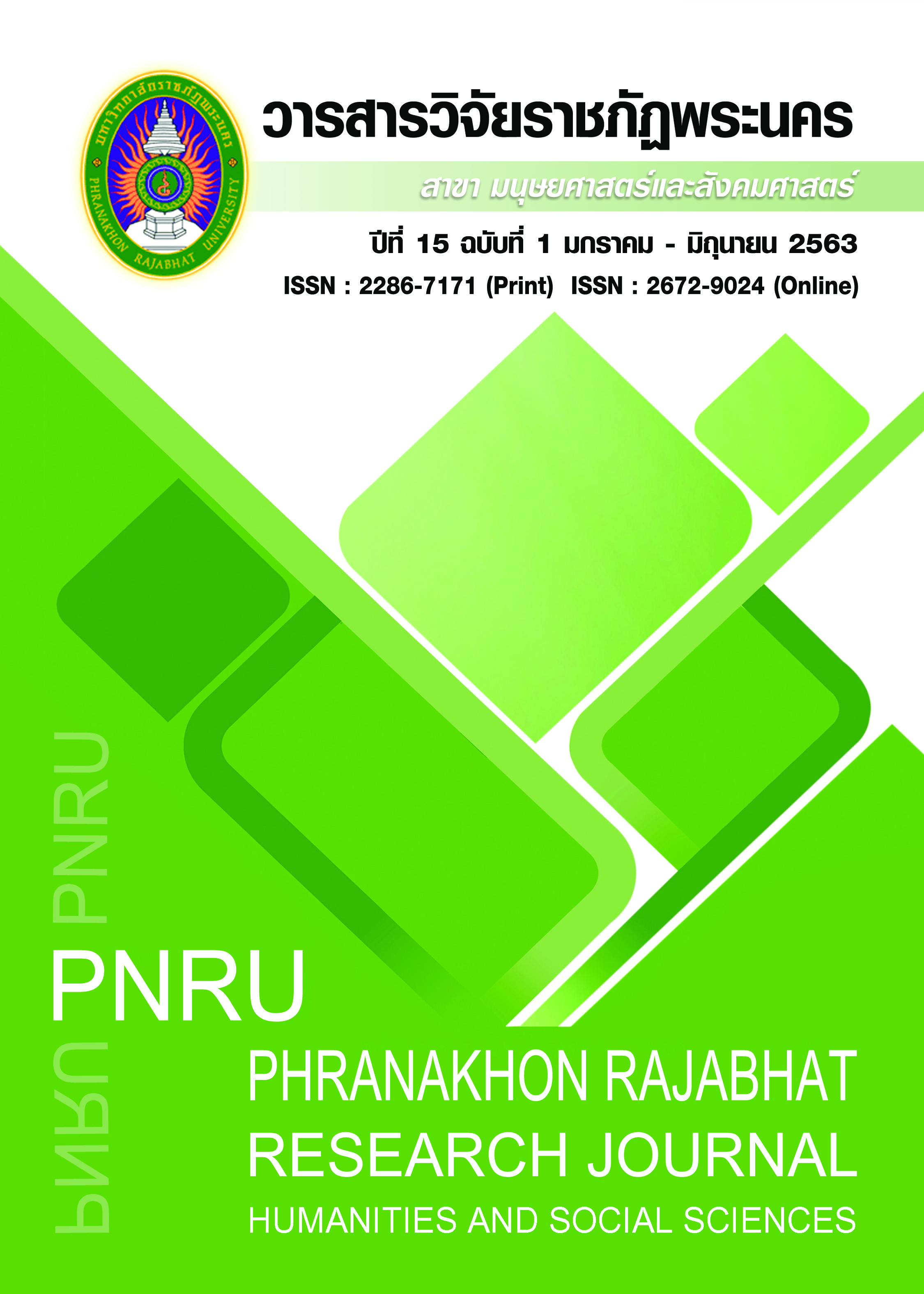THAI WORKFORCES’ HAPPINESS: AN ANALYSIS OF FAMILY MANAGEMENT VALUE ON RESOURCES (FINANCE AND KNOWLEDGE), HEALTH, AND EMOTIONAL SUPPORT
Main Article Content
Abstract
The ability to work with quality depends on the supporting factors from the family and the organization for achieving work-life balance. Therefore, the organization must manage the workforce based on understanding and responding to the family of the employees as well. For this reason, it is leading to this study with the objectives of studying factors that support the family in three aspects which are in term of resources, health and emotions that affect the happiness of Thai workforces which have work and family balance as intermediate factors. We applied multistage sampling design with sample size 300 from employees who work in retail industry in Bangkok province. The study indicated that emotional sharing factors are the strength of management of Thai families. The other two factors are resources and health sharing are less significant than emotional sharing. Organizations should set policies to encourage employees are able to increase their incomes and have well financial management such as household accounting, promoting health knowledge in every dimension which leads to good resources of the organization.
Article Details
Each publish articles were copyright by Phranakorn Rajabhat University
Any contents which appeared in each articles in the journal were authors personal opinion. It did not relate to Phranakorn Rajabhat University and other instructors in the university. Each authors would take responsibility on their articles. If there are any mistake, the authors will take responsibility themselves
References
Aaron, C. & Ronit, G. (2007). Prediction absenteeism and turnover intentions by past absenteeism and work attitudes. Career Development International, 12(5), 416-432.
Armstrong-Stassen, M. & Cameron, S. (2005). Factors related to the career satisfaction of older managerial and professional women. Career Development International, 10(3), 203-15.
Boonchokcharoensri, S. (2015). Work environment, job characteristics and supervisors’ factors influence employee engagement in Bangkok. Master’s degree in business, Bangkok University. (in Thai)
Dew, J. P. (2007). Two sides of the same coin? The differing roles of assets and consumer debt in marriage. Journal of Family and Economics issues, 28, 89-104.
Eby, L., Casper, W., Lockwood, A., Bordeaux, C., & Brinley, A. (2005). Work and family research in IO/OB: Content analysis and review of the literature (1980-2002). Journal of Vocational Behavior, 66(1), 124-197.
Glass, J. & Finley, A. (2002). Coverage and effectiveness of family-responsive workplace policies. Human Resource Management Review, 12(3), 313-337.
Gray, R. (2012). Physical health and mental illness: A silent scandal. International Journal of Mental Health Nursing, 21, 13-22.
Greenhaus, J. & Beutell, N. (1985). Source of conflict between work and family roles. The Academy of Management Review, 10, 76-88.
Greenhaus, J. & Powell, G. (2006). When work and family are allies: a theory of work-family enrichment. The Academy of Management Review, 31, 72-92.
Hibbert, J.R. & Beutler, I. F. (2001). The effects of financial behaviors on the quality of family life: Evidence from adolescent perceptions. Annual association for financial counseling. Orlando.
Kim, J. & Ling, C. (2001). Work-family conflict of women entrepreneurs in Singapore. Women in Management Review, 16(5), 204-221.
Lapierre, M. & Allen, D. (2006). Work-supportive family, family-supportive supervision, use of organizational benefits, and problem-focused coping: implications for work-family conflict and employee well-being. Journal of Occupational Health Psychology, 11(2), 169-181.
Lim, N. (2016). Cultural differences in emotion: differences in emotional arousal level between the East and the West. Integrative Medicine Research, 5, 105-109.
Lobos, G. et al. (2016). In the choice between health and money. Cad. Saude Public, 32(5), 1-12.
Ribeiro, J. & Galinha, I. (2012). Cognitive, affective and contextual predictors of subjective wellbeing. International Journal of Wellbeing, 2(1), 34-53.
Phengnaren, P. (2004). Factor related to the organization commitment of automobile company employees. Mahidol university. (in Thai)
Pianthong, K., Sarakan, K. & Aksornwong, R. (2017). A factor analysis of work life balance of psychiatric nurses, 31(2), 109-119. (in Thai)
Pongatichat, P. (2007). Work life balance: True stories or just fiction. Journal of Civil servant, 51, 45-50. (in Thai)
Sangsawang, P. (2002). Emotion, Mind and Buddhism. Academic Services Journal. Songkla university, 13(3), 20-35. (in Thai)
Voydanoff, P. (1990). Economic distress and family relations: A review of the eighties. Journal of Marriage and the family, 52, 1099-1115.
Voydanoff, P. (2005). Toward a conceptualization of perceived work family fit and balance: a demand and resources approach. Journal of Marital status and Family, 67, 822- 836.


